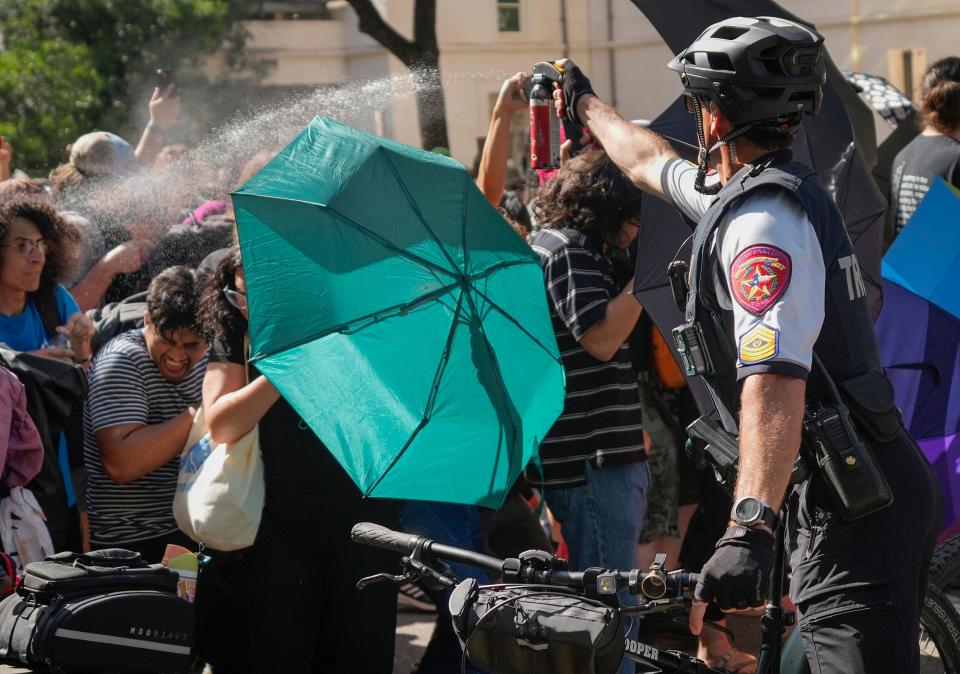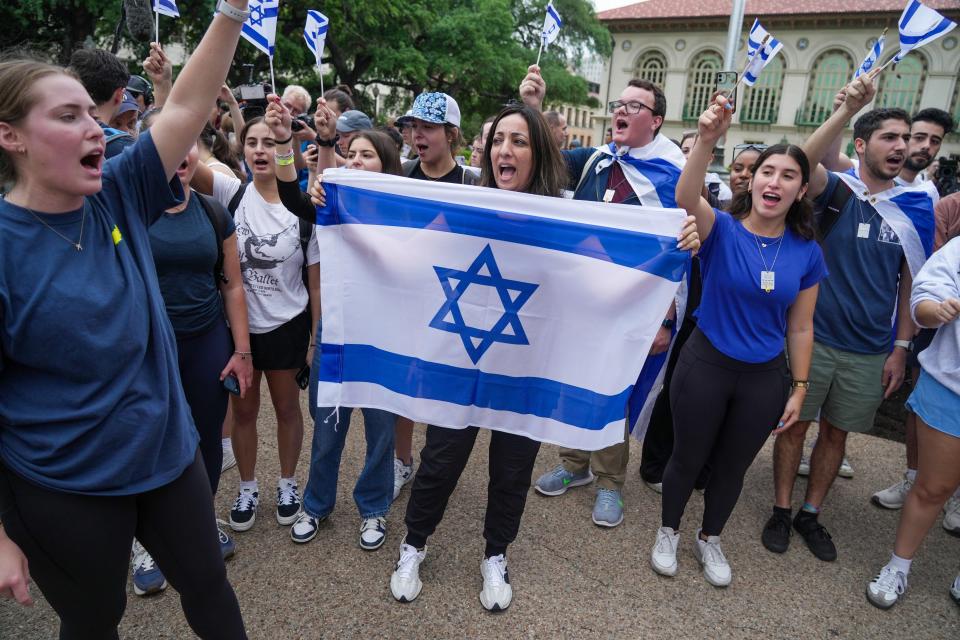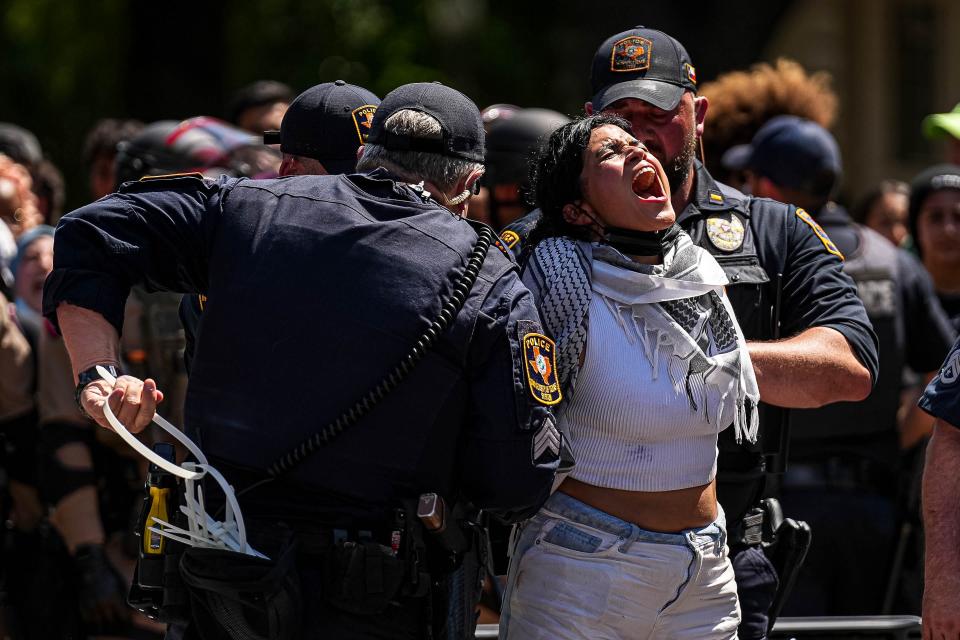As rhetoric and visuals change for UT protests, so can public perception, experts say
- Oops!Something went wrong.Please try again later.
The dominant visuals of state troopers in riot gear tackling unarmed demonstrators during the first days of pro-Palestinian protests at the University of Texas last week would come to be supplanted days later by angry and often profanity-laced chants by protesters — giving pause to the students' supporters and serving as ammunition to those calling for the forceful restoration of order.
On Monday, a tense demonstration held at UT five days after the initial April 24 protest ended with 79 people being arrested. Then a smaller band of demonstrators assembled outside the home of university President Jay Hartzell where they called for him to be removed from office. That gathering was a step too far for several people who described themselves as sympathetic to the pro-Palestinian demonstrators.
"Protesters should not be at President Hartzell’s house. I am upset (with) him too, but this is threatening to him, his family & neighbors," state Rep. Gina Hinojosa, D-Austin, said on X, formerly Twitter, the following morning. "If you want to be purveyors of peace, use peaceful means."
Hinojosa spent several hours at UT on Monday and even caught the taste and smell from the pepper spray that some law enforcement officers blasted in the faces of demonstrators as a would-be encampment was torn down from the campus lawn south of the iconic UT Tower.

Later, as demonstrators moved to an area northwest of the tower, some shouted profanity-laced insults and likened the police officers guarding a Travis County sheriff's bus being used to take people to jail to members of the Ku Klux Klan.
During the first two days of protests at UT, which coincided with numerous others at universities across the nation — many far more violent — the pro-Palestinian chants focused on how Israel was prosecuting its war with Hamas, a militant Palestinian group that launched a deadly attack on the Jewish state on Oct. 7. But some of the chants on Monday carried a different tone.
"Israel is a racist state," was an oft-repeated refrain.
Jeremi Suri, a UT professor of public affairs and history who is Jewish, last week pushed back at suggestions by Gov. Greg Abbott and others that UT demonstrators were antisemites whose aim was the destruction of Israel. But one week later, Suri told the American-Statesman that the tone of at least some of the protesters had shifted.
"I do think we have seen more evidence of antisemitism in the last week with the second protest and with the rhetoric around that," he said. "More antisemitism from people on campus at UT and more antisemitism on other campuses around the country. Obviously, we're all watching that."

But Suri said that some of the heightened anger could be a logical reaction to what he called the "over-reaction" by the university's administration and by law enforcement.
"This week, you saw more and more student radicalism, more protest activities — protests at the president's house, which is inappropriate," he said. "I think no one no one should have people coming into their house and threatening their family."
At a news conference Wednesday in Washington, U.S. Sen. John Cornyn, R-Texas, seized on reports that many of those arrested at Monday's protest were not UT students, and he used that to justify the show of force on campus from the outset of the demonstrations. University officials at campuses where protesters were seeking to occupy buildings should follow UT's lead, Cornyn said.
More: Two new misdemeanor charges filed for Fox 7 Austin photojournalist covering UT protests
"I suggest that these administrations take note from my friend at UT-Austin, President Jay Hartzell, who has taken swift action to break up demonstrations before things turned violent," Cornyn told reporters. On Tuesday, he said, "the University of Texas in Austin announced that nearly half of those arrested on Monday had no affiliation with the university."

A poll released Wednesday by UT's Texas Politics Project showed that while the campus protest, like those at universities across the nation, promotes the cause of establishing a Palestinian state in the Middle East and reining in the tactics of the Israeli military in Gaza, a plurality Texans see the issue as more complex.
The poll, taken before the recent demonstrations began at UT but after they had started elsewhere, showed that 35% of Texans favor the nation's policymakers striking a balance between supporting Israeli military efforts and preventing Palestinian war casualties in Gaza, where more than 30,000 people have been reportedly killed. Only 14% said preventing Palestinian casualties should be the chief focus, and 16% said the U.S. should steer clear of the current conflict.
The poll's findings appear to bear out the suggestion by Ben Voth, a professor of rhetoric and director of debate at Southern Methodist University in Dallas, that the words and actions of both the campus demonstrators and the UT administration might be out of sync with the public at large. Voth said he has done extensive research into public protests, especially what happened during the long struggle for civil rights and racial equality.
More: 500+ faculty members sign letter of no confidence against UT president over protests, DEI
"I do think that there is rhetoric within the Gaza protest movement that is too aggressive and is oftentimes tone deaf," Voth told the Statesman. "There's this thing where the police, especially in Austin are being called Nazis and KKK, and that's actually completely counter to the way the some of the most classic civil rights protest happened in the United States."
As director of debate at SMU, Voth said the default strategy for influencing public policy should be dialogue instead of confrontation.
"Let's have a debate," he said, describing how the university handled a recent point of campus controversy. "Let's have an engagement. Let's talk about what the interests are back and forth."
This article originally appeared on Austin American-Statesman: Experts: Over-reaction to UT protests can be blamed on both sides

